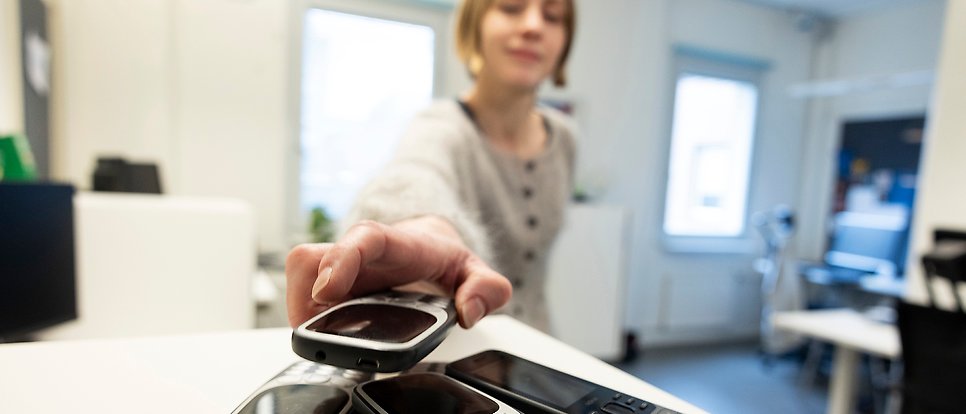Basic mobiles save money and the environment

Basic mobile phones make a big economic and environmental difference, according to Renée Sundbom from the Department of Public Health and Caring Sciences. Photo: Mikael Wallerstedt
At the Department of Public Health and Caring Sciences, staff use either smartphones or more basic ones. Using more basic mobiles saves money, but it is also kind to the environment.
Hello Renée Sundbom, administrative manager at the department, does this really make a difference?
“There is a big economic difference both in terms of purchasing and maintenance! Just the fact that we don't have cracked screens is a saving. We haven't given much thought to the environmental aspects, but they are also present.”
Before the pandemic, many staff had landline phones. During the pandemic, the department switched to MEX telephony, which led to a major purchase of phones. MEX is an acronym for mobile extension. In short, the service provides access to switchboard functions on a mobile phone.
“Those who did not need smartphones were given more basic models,” says Sundbom.
But this is not the only saving the department is making on phones.
“Some people who share a room also share a phone, with some having dual sim cards in their personal mobile phones,” explains Sundbom. This reduces purchasing levels for phones. “We also recycle all phones when employees leave.
Dual sim cards mean you can have two mobile phone subscriptions or prepaid cards with different numbers on the same phone.”
How many of your staff have basic mobile phones and which staff are they?
“Around 60–70 people, some of whom share the same phone,” replies Sundbom. “We are governed by need, not professional category, so those who have basic mobiles are doctoral students, administrators, researchers and teachers.”
The simpler mobiles are basically used to make and receive phone calls, which doesn't work for everyone.”
And what about the environmental benefits?
“We’ve also just realised that at least some of the mobiles need to be replaced because they run on the 3G network, which is being phased out,” continues Sundbom. “Having to throw away mobile phones is not environmentally beneficial. But as long as we can use them, they are environmentally friendly because they don’t consume much battery power and we don’t have cracked screens.”
Ulrika Hurtig
Fakta
Do you have any good savings tips for your workplace, preferably ideas that cover both finances and the environment? Drop me an email and let me know: ulrika.hurtig@uu.se Please indicate if you wish to remain anonymous, because if we receive any good savings tips the editors would like to publish them.
